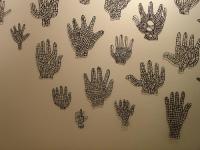Posted on September 2, 2009

Launching our "Letters for Lulu" campaign this week prompts us to reflect on the role and mandate of the state in the management of the South African archive, our heritage.
Sikhumbuzo Mhlongo hanged himself last week because 'a Pinetown Home Affairs official tore up his application for an identity document, effectively preventing him from getting a job' (Mail & Guardian report). His ID application was refused - denying him his past and his future - because his parents, having died, did not accompany him in making his application.
An ID document is to an individual what an archive is to a country - proof of a history, an account of its actions. An archive, understood in this way, is not just a collection of documents - it can include important places (like Robben Island), memories or objects. How we manage our archive affects our identity, our account of ourselves and how we can respond to the opportunities of the future. The archive is particularly important in a country like ours with a highly contested and conflictual past, in a old continent accused so long by the West of being 'without a history'.
Heritage Month and the funeral of Sikhumbuzo Mhlongo provides us with a chance for reflection on how we have been looking after our archive - our heritage - and a chance to re-prioritise.
Since 1994, the Department of Arts and Culture (DAC) has been mired in a managerial bind - teetering between its role in providing 'arms' length' support and its role in leading certain kinds of transformation and development.
On the one hand, we borrowed from the Dutch idea of an 'arm's length' approach to government engagement with arts and culture, hoping to foster creativity and independence after the heavy-handed interventionism of the Apartheid state. Devolution of authority meant that provincial government shared a concurrent mandate for arts and culture, taking more institutions out of the direct control of the national department.
On the other hand, national government wanted to use a transformed museum and heritage landscape much more instrumentally from the national perspective as an engine for social development (social cohesion, ubuntu), developing the idea of a common past in struggle as the basis for a common citizenship. Cultural industries (craft, music, publishing) would be an engine for economic development.
These are noble aims in many ways, but there was tension between them, and in spite of some commendable successes, many arts and culture institutions, old and new, are in crisis today, caught between poor management, uneven funding, weak leadership and a lack of vision. The resignation of the Acting CEO and the entire Robben Island Museum Council a few months ago speaks to this crisis, and other important museum collections and heritage sites are teetering on the brink of collapse.
In 2007 an open report on the crisis in archives, Archives at the Crossroads, was submitted to the previous minister by the Nelson Mandela Foundation. No response has been forthcoming. It has been reported this year that archives in Pietermaritzburg are in a parlous state. This is far from the dream we had in 1994 that archives would be open, accessible, promoting freedom of information and state accountability.
To address the crisis in the sector, DAC needs to strengthen institutions, but also move beyond the managerial bind, developing a stronger vision for the future. Arts and culture has to grasp the thorniest questions around our present and the future, such as the imagining of citizenship, creating the conditions conducive to the emergence of new cultural forms and new histories that will service our future, unblinkered by prescriptive nationalisms. How can we shape our future without a stronger understanding of our past? Heritage tourism is promised as a focus for 2010, but can we deliver more than the worn out rainbow nation script without looking after our historical record? Is state accountability feasible without a strong and accessible public record?
It's not just the role of government to shape this vision and resolve the crisis: all of us need to contribute. What will you do?
As the Archival Platform we welcome the desire of the newly elected government to listen to the people and improve service delivery. This year, a number of hard hitting reports from SCOPA have noted that records management in the country is poor, although it is critical to the maintenance of state accountability. This prompted government departments to prioritise better records management and the establishment of a new Ministry responsible for Performance, Monitoring and Evaluation.
That's why in the spirit of Tips for Trevor, the Archival Platform launched our Heritage month campaign, 'Letters for Lulu', the Honourable Minister Lulu Xingwana. Write to her about what you think the problems are in the arts and culture sector, and who needs to do what to resolve them. Email all scanned letters to {encode="director@archivalplatform.org" title="us"} and at the end of heritage month the Platform will deliver them all to the Minister.
Photo attribution Creative Commons license